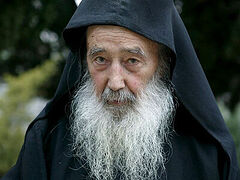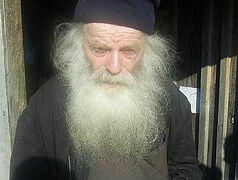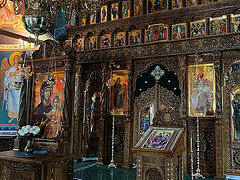Archimandrite Justin (Pârvu) is one of Romania’s most beloved and revered elders, and our contemporary (1919–2013). In 1948, he was arrested and sentenced to twelve years in prison “for his political views,” and in 1960, at the end of his sentence, he was given another four years in prison for refusing to renounce the Orthodox faith. After the fall of the communist regime in Romania, he became the founder and abbot of Petro Vodă Monastery. From a spiritual point of view, what makes today’s times more difficult than the period of open persecution against believers? What problems does modern monasticism face? How should we live in this era of spiritual impoverishment? Archimandrite Justin answers these and other questions about the spiritual life.
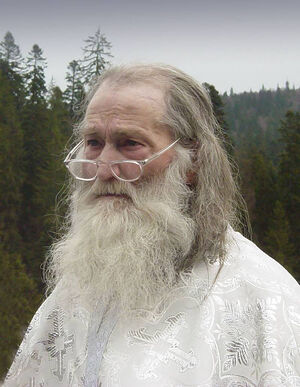 Archimandrite Justin (Parvu) —What can you tell us about the difficult times that we will also go through?
Archimandrite Justin (Parvu) —What can you tell us about the difficult times that we will also go through?
—Indeed, what we have been through, and what you will go through! You’ve already begun to sense these times. Unlike other times, God will allow the enemy to touch the soul; it will be more of a psychological torture and you won’t be able to hide even in the crevices of the earth. It’s not easy; these are very difficult times.
For example, during the time of the great ascetics, neither the police, nor the state, nor financial control entered the Thebaid Desert to bother the monks. They were self-sufficient and so free that they could truly bear their labor with all their love. And in our times, we must battle with both the seen and the unseen—battle with ourselves, battle with the world, battle with the devil. The devil? You cross yourself and he leaves. But the visible enemies don’t leave; they take you by storm and load you up with more and more; they come with 666, then with identity cards, a tractor, an engine, chips, radiation, the Holocaust—and all this affects you.
That’s why, for example, these believers flocking from everywhere to the monasteries, are again a sign that everyone lives in this seething, in this boiling cauldron, moving from one evil to another. And a monk, for better or worse, must stand before them, give them counsel, explanations, read prayers over them so they leave there at least a little different than how they went in. A monk should stand on duty and respond to all these needs of the Christian. Once upon a time, nobody disturbed the saint, the ascetic.
And how many commemoration sheets did we have seventy or eighty years ago at Durau or Secu Monastery? You went to the proskomedia, started the service. As a priest, you rang the metal clapper at the entrance gate, and everyone knew the priest had entered the church. And the sexton was already there. What’s the sexton’s obedience? He goes to church, makes a prostration, takes a blessing from the bishop’s place, goes and venerates the icons of the Most Holy Theotokos and the Savior Christ, goes into the holy altar, does three prostrations at the door, three prostrations at the table of oblation, and with the fear of God begins to light the candles: two candles on the holy altar, lampadas. There was a three-step ladder for this. The poor sexton would climb up it, puffing hard, but he wanted to light the lampadas at every Midnight Office, to be there first, before the serving priest came. Then he’d go to the rector to get a blessing to sound the toacă and bell, and the rector was no longer asleep, but ready, alert.
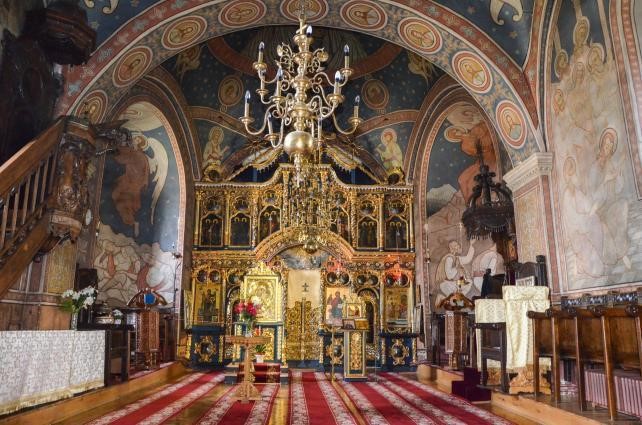 Interior of Durau Monastery, with the Bishop’s throne on the right
Interior of Durau Monastery, with the Bishop’s throne on the right
And now he has an eight-seater car and luggage in the back, and one morning he goes to get bottles, the next day he needs a broom, then a handle for the broom, and he keeps going and going, sometimes attending a conference, going to exams, and other places, only not to church or at Matins. And the sexton has nowhere to go, hitting the toacă with twenty-five blessings from … a light bulb. We used to finish the commemorations before the priests arrived, but now we have three to four folders with commemoration lists a day.
Also, to return to the point, there weren’t so many needs and diseases. And now mental and organic diseases and demonic possessions have multiplied. There also wasn’t such a mass of buildings, animals, people. Moreover, now we have the temptations of super-technology—these extremely sharp systems that penetrate to the point of knowing your thoughts. And once they’ve captured your thinking, there’s the soul’s part too. And once satan comes in, it becomes quite difficult. It’s a battle against the soul.
Can’t you see what they’re doing now? Do you want a better job? You have to join the Masonic lodge, renounce Christ. And these are all trials, temptations, and difficulties that tear us away from the true goals of our life. They reduce our spiritual life to nothing.
—How do you see the spiritual revival of monasticism?
—With a cell phone and fancy cars… It will happen together with the revival of Christianity. Monasticism is a member of the body of Christianity, which weakens along with it. We’ve reached a state where monks have become like laymen, and the laymen like demons. Christianity has become very weak, and I don’t know if it will get better.
—Not even after a new sacrifice of Christianity?
—If it still makes sense. But in my view, the prisons were the foundation for the rebirth of our Christianity. In other words, we must pursue willing labors: fasting, keeping vigil, praying, and living in the name of God. Feel His presence wherever you are. So, food—three times a day, obedience—if you can, let your brother be, and so on.
—Why can’t the spiritual life be corrected anymore?
—Because love between brothers has weakened and people can’t find a common language anymore. And how can something be built anew without unity?
—What can we do to preserve love and unity among us?
—We have to pray a lot, because prayer supports mutual understanding. But we care more about material things now than about spiritual things. Previously, the forces of evil were bound by the prayers of great ascetics; their prayer had great power. God has not yet unleashed the powers of satan because people aren’t prepared. The devil’s power lies in our passions and evil.
—What most characterizes modern monasticism?
—Today’s monks are seriously lacking in obedience, and they don’t know how to confess; they don’t confess sincerely. If a monk told the truth in Confession, he would die. Today he asks your blessing to go to Iași, and he winds up in Constanța, because … it was on the way.1 The virtue of obedience has been greatly trivialized and relativized. Today’s monks no longer have the strength to obey their elders as they once did.
The relationship between disciple and mentor has collapsed, and perhaps that’s why God has taken this gift away from us. But I understand them: Romanian monks are so disordered and powerless to obey orders and commands because Romanians are like that. The Romanian people are scattered by nature; we no longer have the Dacians2 or the Christians of old; but now there is such intermarriage, that our nature, our psychological structure is changing. All this amalgamation gives rise to all these vices and curses that exist in our families. But I don’t think the soul should be forced. I still give laymen a piece or two of advice, but I leave the monks as they are.
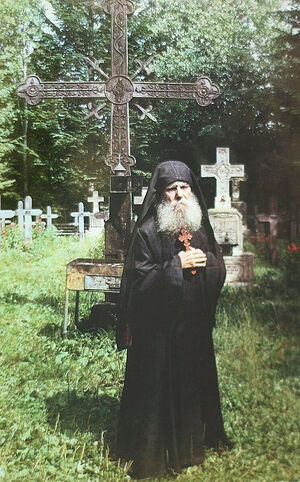 Hieroschemamonk Paisie (Olaru) —What can we do to strengthen our faith and endure everything that awaits us? From the prophecies of the saints we know that if Christians will endure the tragedies of the latter times, they will be greater than the first Christians. St. Paisios the Athonite even says that many saints would have liked to live in our times.
Hieroschemamonk Paisie (Olaru) —What can we do to strengthen our faith and endure everything that awaits us? From the prophecies of the saints we know that if Christians will endure the tragedies of the latter times, they will be greater than the first Christians. St. Paisios the Athonite even says that many saints would have liked to live in our times.
—Think about death. Doesn’t the monk and the Christian have this great duty to be ready to depart? They do! You don’t care whether you live and how you live. People are becoming increasingly more difficult and have diminishing intellectual capacities and reasoning abilities.
—Father, we know that since the times of St. Symeon the New Theologian, there are fewer and fewer spiritual guides. Today, when we’re witnessing a great spiritual impoverishment, how can we recognize a spiritual leader? Sts. Kallistos and Ignatius Xanthopoulos indicated three criteria: to be high in understanding, humble in thought, and meek in behavior.3
—It’s hard to find one, but you don’t have to drive yourself crazy trying to find a spiritual guide. Anyone who is truly looking for a spiritual guide will eventually at some point sense who it is. The soul senses who it needs to trust, because God puts love in the heart for the one whom he has deemed for you to follow. I couldn’t wait to get out of prison just to see Fr. Paisie (Olaru). My heart was burning in my chest with the desire to see him, and after being released I went straight to the cell of Fr. Piaisie and waited two days at the door for him to receive me for Confession. And for eight years, I was never separated from Fr. Paisie’s loving care. At first, he sent me to Fr. Cleopa, but I didn’t feel such spiritual peace with him, even though after sixteen years of imprisonment he had started to leaf through thick books of canons.
The connection between disciple and confessor is very strong, and many miracles can be done in its name. But it’s not enough for the guide to be tried—he must also be of the same spirit as the disciple.
—Father, what did you learn most from Fr. Paisie (Olaru)?
—Humility and love of neighbor. He was a man of rare spiritual warmth and tenderness. Fr. Paisie was constantly, tirelessly with people, such that he completely forgot about himself.
—Is it good to look for spiritual guides in our days?
—It’s better to acquire a little spiritual understanding yourself, for the times are coming when not only will you not be able to find only a guide, but not even a word from the Scriptures or the Holy Fathers. The Holy Fathers counseled us to be guided by Holy Scripture and the writings of the Holy Fathers, but there’s coming a time when we won’t have them.
—And until those times?
—Until then, learn them by heart. In prison, we always had the moleben to the Most Holy Theotokos and various akathists in mind, which were of great help to us. True prayer isn’t offered in a monastery, even if it has all the external conditions suitable for contemplation and prayer. In prison, we were deprived of the beauty of this outline of the Carpathian Mountains: We just sat in inside four walls for decades without seeing a ray of sunlight through the cracks of the window lattices. And if you somehow climbed up to see a ray of sunshine, the guard was waiting behind you to give you a sentence of five days in solitary confinement, so you wouldn’t come out of there in good shape.
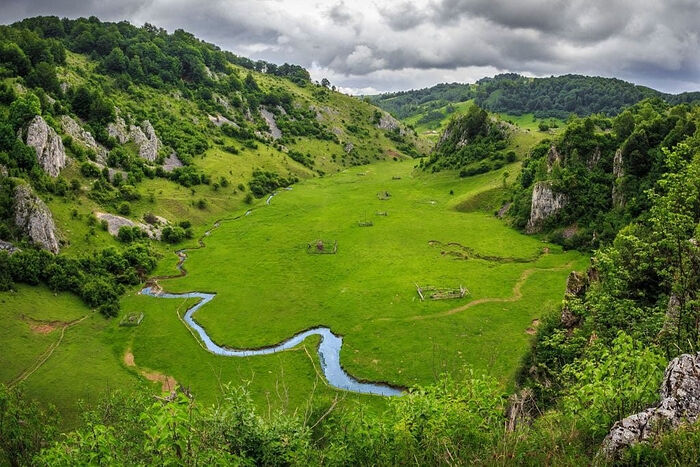 Fundătura Ponorului Valley in the Western Carpathians
Fundătura Ponorului Valley in the Western Carpathians
This suffering was the true monastic state. At the foundation of a monastery is suffering. Do you want to live as a Christian, to get closer to God? You must strive to move from the praises made by the Church, to not just say them as mere words, but to experience this warmth of grace and transform them into spirit, to dematerialize this word, which we now sometimes distort by rushing to finish the services, by singing the Holy Liturgy too hastily, when we should have forgotten about all worldly cares.
Experience and suffering awaken prayer in a monk. Observing rules and orders without this lived experience leads to dispersion and extinguishes the spirit of prayer. God doesn’t need you to recite prayers to Him, but He wants your word to become transparent.

